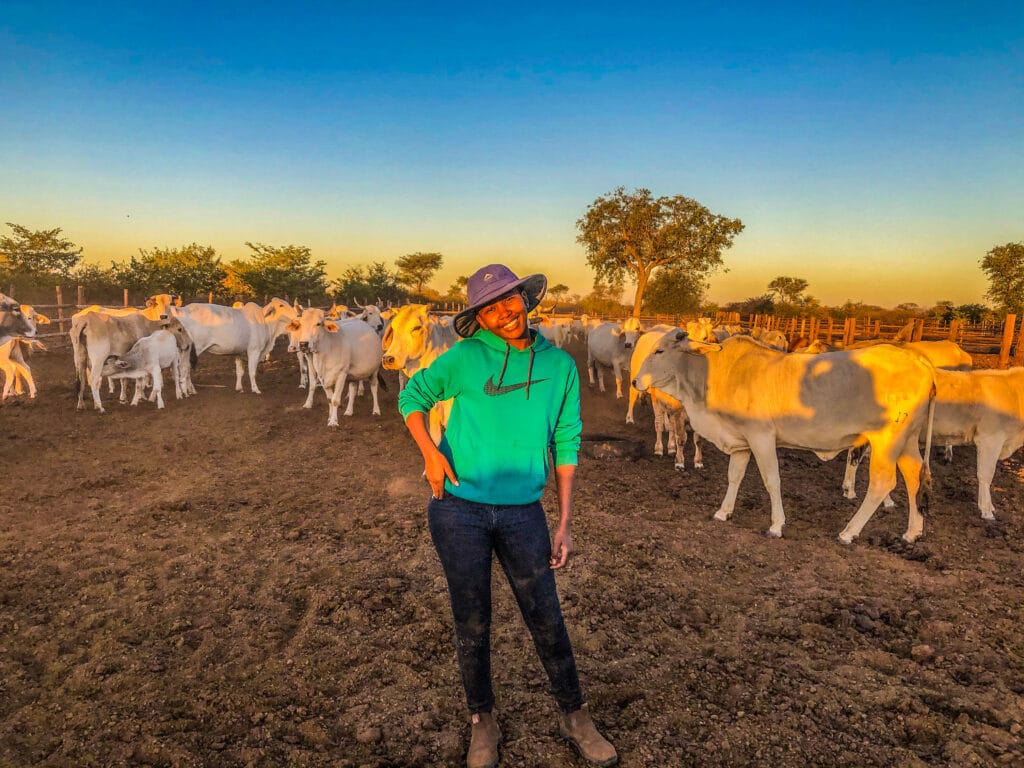Kushata Moesi had been exposed to farming at a very young age, thanks to her father and entrepreneurial mother. She says that although she didn’t know what was going on around her at the time, she eventually got to appreciate and understand what farming entails.
“Papa made it a point to show me that everything I wanted and asked, from him depended on whether he had sold enough cattle or not. I grew up with that engraved in me and it is exactly what I practice now. Apart from being something I love wholeheartedly and naturally, I appreciate how it instils discipline in me. It forces me to be strong, whether I want to or not,” says Moesi.
Cattle enterprise
Moesi forms part of a critical mass of young women who are blazing the trail by challenging male dominance in farming in Gaborone, Botswana. Today the 23 year-old Moesi manages her family-owned cattle enterprise with minimal assistance from her father. Called the Iètša Ranch, on 4000ha , the farm specialises in breeding and raising cattle for beef and currently employs four workers. Their herd sires are Chianinas with the cows are a mix of Brahmans. Moesi had since diversified her portfolio by adding commercial boer goat rams on Tswana goat ewes.
Farming in goats
Moesi says she also used to breed rabbits and quails but as time went by she developed an interest in breeding bigger animals such as goats and cattle. She says the reason why she branched into goat farming is because goat’s meat is highly priced and it is also not easily accessible to the public. Moesi says her daily chores include checking livestock, feeding, patrolling the ranch, maintaining the fence as elephants tend to rampage through and updating records.

Farm duties
Depending on what season of the year they are in, Moesi says, other activities include: dipping, tagging, de-horning or hoofing, castrations, vaccinating, weaning and rotating paddocks.
Expensive goat meat
Moesi says another reason why she chose goat farming is the fact that the price of goat is exorbitant. “So I thought I could make it easier for meat lovers to get it in larger quantities at a reasonable price. Also, I realised that most people don’t eat beef and so they need an alternative, other than chicken.” She says her father has many goats kept primarily for household consumption, but since she took over she decided to sell the goats, particularly the old ones to get new breeding stock. She decided to sell to members of the public instead of relying on butcheries because the margins from the latter were just not worth it. Dealing with individuals also helped market her business through word of mouth and she continually strives to ensure she gives her customers value for money.
Main source of motivation
She says her parents remained her sources of inspiration. Despite her father having a full-time job elsewhere, he still manages to find time and work on his farm. Moesi says her father ensures the farm runs smoothly at all times while her mother provides sound business advice. She highlights distance as one of her biggest challenge, saying the farm is far and this means she is not there most of the time. As a result she depends on caretakers to look after the animals. But the little time she finds, Moesi makes sure she spends on the farm to ensure all is in order. Regarding the future of her business, Moesi gives herself five years within which she is confident the company would be self-sustainable.
Moesi is also continuing with her studies, currently pursuing a BA (Hons) degree in event management at Limkokwing University and also own Speckled Egg Farm & Events. She says she decided to pursue this course so that she can merge her passion for organising events with her love of agriculture.







